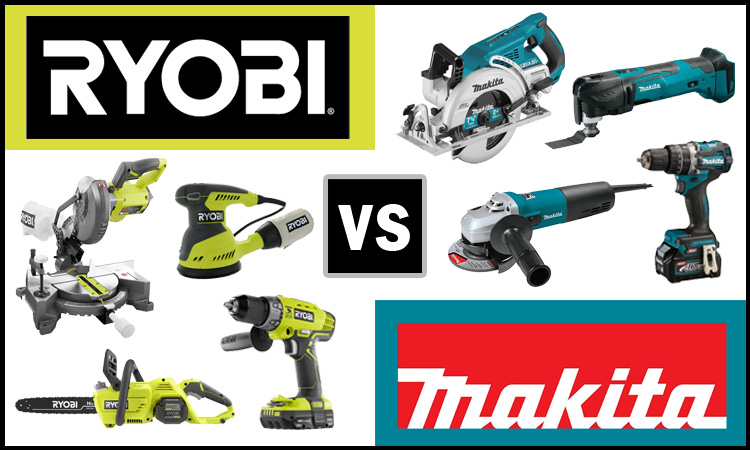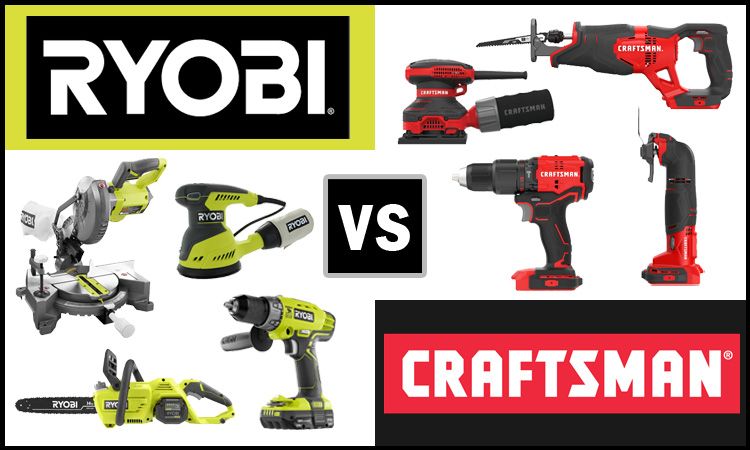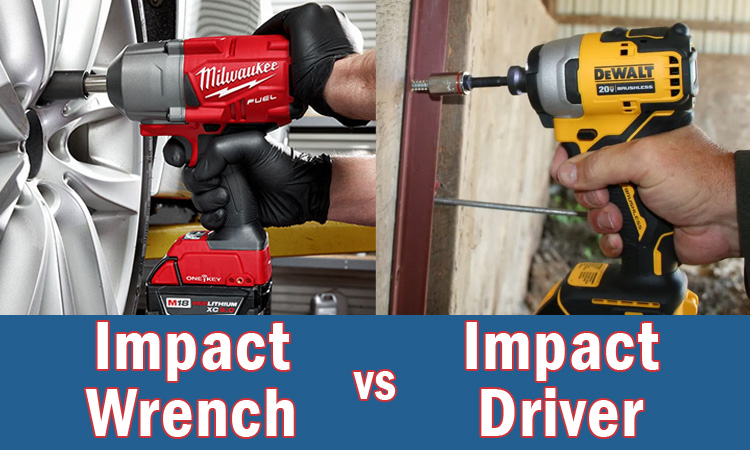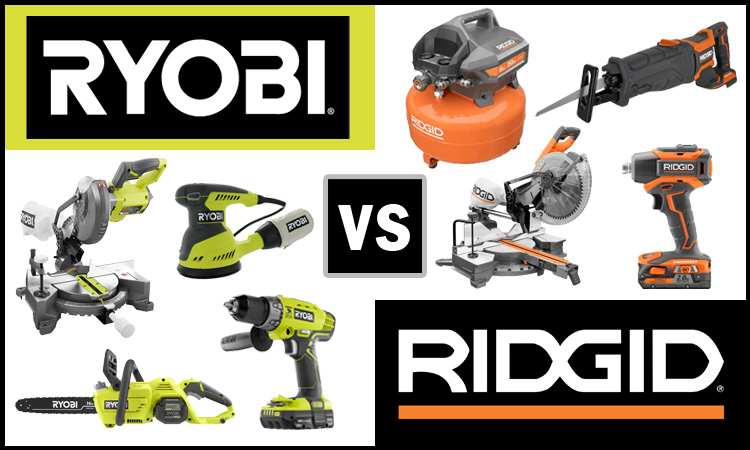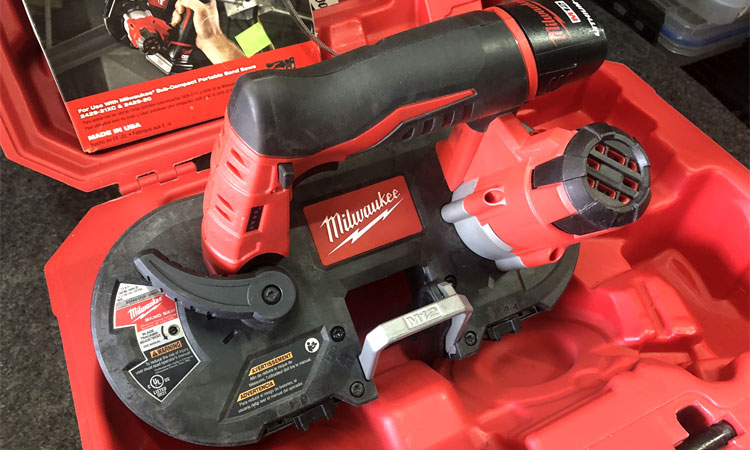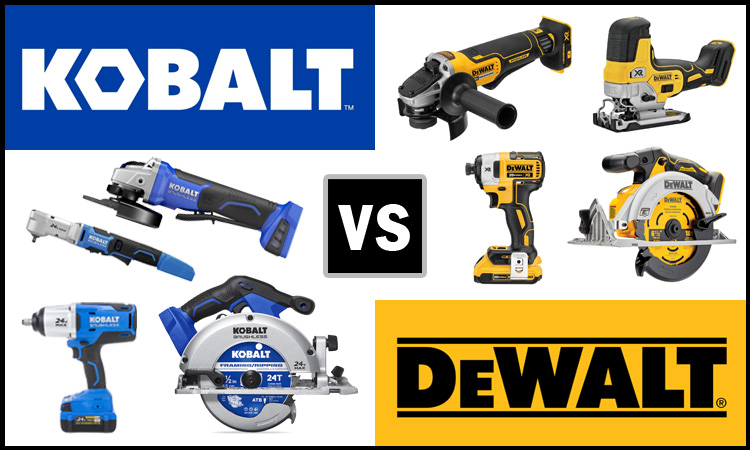Porter-Cable vs Craftsman (Which is Better?)
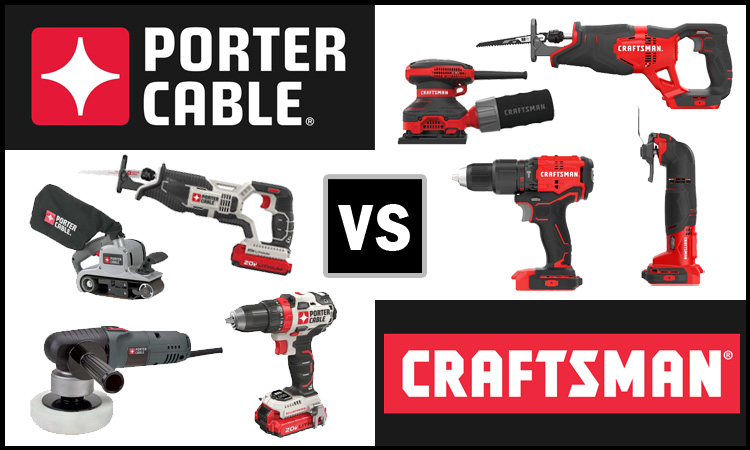
Today’s tool industry is quite complex, with many brands belonging to larger parent companies. This often creates confusion among consumers when comparing one specific brand to the next.
This is especially true when two particular brands offer extremely similar product portfolios, making it difficult to identify discernable differences between each.
This is the case with Craftsman and Porter-Cable, both of which are two of the most readily identifiable of all tool brands. However, due to both brands being managed by Stanley, Black & Decker, Craftsman and Porter-Cable’s offerings are somewhat similar in scope.
Because of this, we have compiled the following guide to identify the differences between these brands. What follows is a comprehensive side-by-side comparison of Porter-Cable and Craftsman, regarding a number of key characteristics.
History
The Porter-Cable and Craftsman tool companies have both been in existence for almost 100 years. During these years, both companies have taken the necessary steps to produce some of the most premium tools available.
The following is a brief summary of Porter-Cable and Craftsman’s rise to prominence within the domestic tool industry.
About Porter-Cable Tools

Porter-Cable’s history dates back more than 100-years, to 1906, when the company first began as a jobbing machine and tool shop, located in Syracuse, New York. In the years that followed, the company began manufacturing a number of simple, yet highly marketable items, including pencil sharpeners, automatic tire pumps, and gas lamps.
Later, in 1926, Porter-Cable delved into power tool production, with the unveiling of their own line of portable sanders. This was then followed by the release of a revolutionary High-Speed Helical Gear Drive Saw in 1928. It was during this time that Porter-Cable’s popularity grew to a mainstream level.
In 1960, Porter-Cable was purchased by Rockwell Industries, which ultimately relocated the company’s operations to Jackson, TN. Within the same general time period, Porter-Cable also broadened its product catalog, to include such power tools as the portable band saw and a high-speed orbital sander.
Following Porter-Cable’s acquisition by Rockwell Industries, the company’s focus shifted toward producing economically-priced consumer-grade tools, in direct competition with Black & Decker. Rockwell also dropped the Porter-Cable name, bringing the brand itself a certain level of anonymity.
Porter-Cable was eventually purchased by Pentair, Inc. in the mid-1980s, at which time the commercial use of the Porter-Cable name was restored. Pentair, Inc. continued to focus on the production of economical consumer-grade tools, removing the brand from the professional market in its entirety by the end of the decade.
Ironically, after years of direct competition, Porter-Cable was purchased by Black & Decker in 2004. Today, Porter-Cable is still headquartered in Jackson, TN, though much of the manufacturer’s operations take place elsewhere.
Related: Porter-Cable vs Milwaukee (Which is Better?)
About Craftsman Tools

The Craftsman tool line was founded in 1927 by retail behemoth Sears to provide high-quality hand tools. The Craftsman parent company had been operating since 1892. Due to the evolution of how Americans want to buy tools, Sears made the decision to start a house brand product line.
Tom Dunlap was given the responsibility of re-structuring the hardware team at Sears a few years ago. DIYers and mechanics all took great delight in owning their own top quality tools and equipment, which Dunlap recognized.
Tom decided to capitalize on this sentiment and develop his own “in-house” brand line of hand tools rather than relying on old ones currently available. As a result, the Craftsman range for Sears was created.
The Craftsman tool line has grown over time to include almost every trade professional’s tool imaginable, including drill/driver, ratchets, wrenches, pliers, and screwdrivers. The Craftsman product catalog now includes a variety of power tools and combo kits, such as the V20* 2.0Ah Lithium-Ion Starter Kit, V20* Cordless 8-Tool Combo Kit, V20* WEEDWACKER® String Trimmer & Blower Combo Kit (1.5AH) and many more. Emerson Electric, Techtronic Industries, and DeWalt are among the many manufacturers of these power tools.
Craftsman Tools is no longer available only at Sears. In fact, Craftsman instruments are now widely accessible on Lowe’s, Amazon, and Ace Hardware, among other outlets. Stanley Black & Decker currently owns Craftsman tools.
See Also: Craftsman vs Ryobi Tools (Which is Better?)
Manufacturing
Many consumers take into consideration the origins of any product in which they are intending to place their hard-earned money. This is why many consumers wish to know more about the manufacturing processes of their favorite tool company.
The following is a brief description of Porter-Cable and Craftsman’s current manufacturing practices.
Where Are Porter-Cable Tools Made?
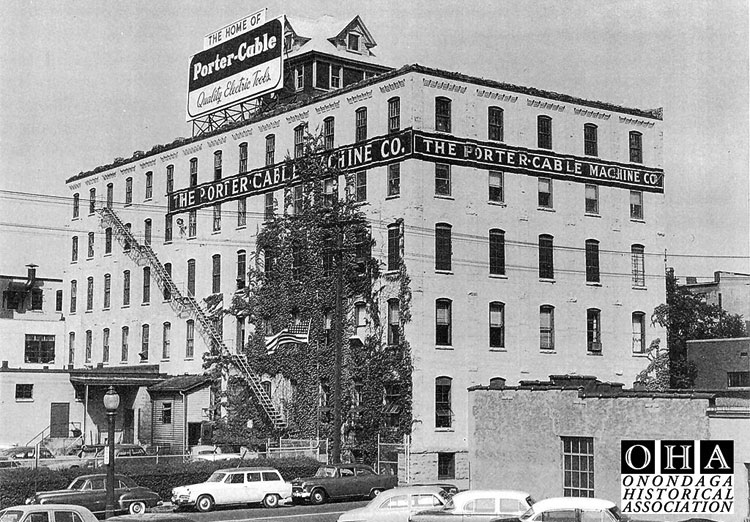
Initially, Porter-Cable tools were produced in America. During the company’s earliest days, manufacturing took place in Syracuse, New York. Later, following the company’s acquisition by Rockwell Industries, manufacturing was moved to Jackson, TN.
Today, this facility is used primarily as a warehouse, while the vast majority of Porter-Cable’s current product production takes place in Mexico and China.
Also: Porter-Cable vs DeWalt Comparison
Where Are Craftsman Tools Made?

Until 2010, almost all Craftsman tools were made solely in the United States. However, most of Craftsman’s power and hand instruments are now built in China and Taiwan, with a few produced in other countries.
Any Craftsman tools still produced in the United States are clearly marked on the box for consumers’ inspection. Many older, US-made Craftsman instruments are highly sought after and bring a premium on the secondhand market.
Related: Craftsman or Milwaukee (Which is the Better Value?)
Product Line
Porter-Cable and Craftsman each offer a comprehensive lineup of premium hand and power tools. Therefore, we have compiled brief summaries of each brand’s current product offerings, allowing you, the consumer, to decide for yourself.
Porter-Cable
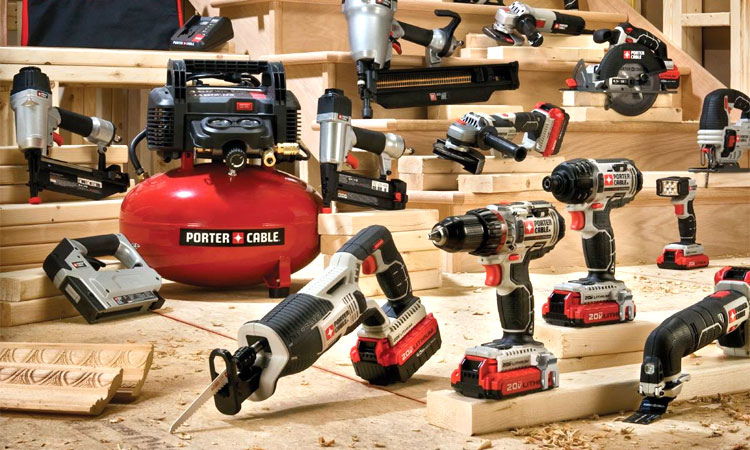
Porter-Cable has recently popularized a new line of power tools, which utilize a universal battery/charging system, known as the 20V MAX series of power tools. Tools within this series share a common battery design, thereby promoting superior versatility.
This lineup of tools most notably includes impact drivers, drills, reciprocating saws, circular saws, and lights.
Additional power tools offered by Porter-Cable include grinders and routers, among others. Porter-Cable also expands upon its product lineup with reasonable regularity, making it likely that consumers will be presented with a number of additional power tools of both the cordless 20V MAX and corded variety in the near future.
Along with a comprehensive lineup of power tools, Porter-Cable also produces and markets a wide array of power tool accessories and combo kits such as 20V MAX* Cordless Compact Hammer Drill Kit, 20V MAX* Cordless Hammer Drill (Tool Only), and others. Some of the most notable of these accessories include specialty drill bits, hole saw bits, joining biscuits, fasteners, and mandrels.
Craftsman
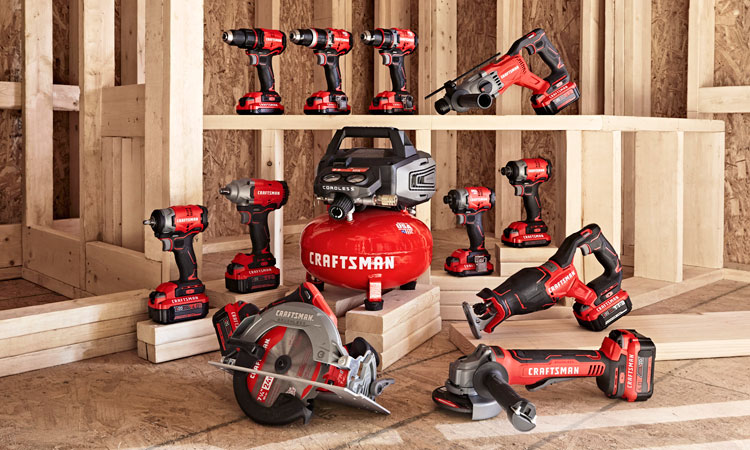
The Craftsman brand has introduced numerous individual power tools over the years. The company is now concentrating its efforts on the manufacture of high-quality portable power equipment. The new collection of V20 Brushless RP power tools, for example, is one such innovation.
Craftsman’s 20-volt lithium-ion batteries, which are meant to provide durability and power for any job, can be found in this line. The V20 family now includes saws, grinders, drills, and impact drivers as well as home and shop convenience products like vacuums, radios, and lights. The company has introduced new products year after year.
Craftsman also offers a wide range of corded power tools, including several bench-top sanders and saws ideal for doing home repair tasks. Many of these tools are available at a very cost-effective price, which appeals to customers on all budgets.
Technology
Porter-Cable and Craftsman have each exhibited a tendency to spearhead innovation, wherever it may arise. This has helped skyrocket each brands’ success.
The following are several high points, pertaining to the technical innovations of both Porter-Cable and Craftsman tools.
Porter-Cable
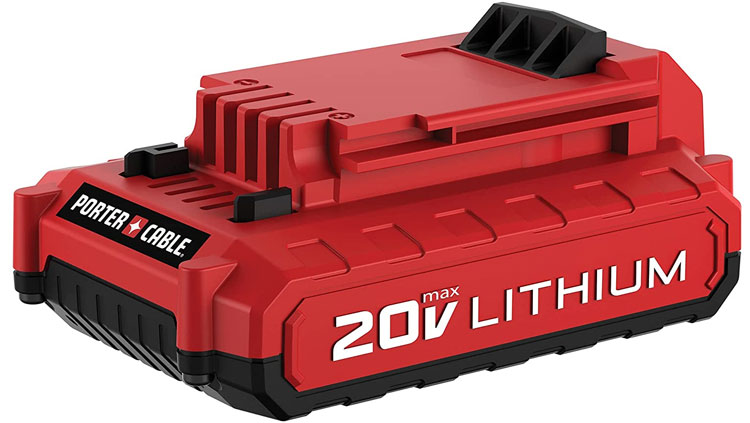
20V MAX Technology
The vast majority of recent Porter-Cable power tools now utilize the manufacturer’s 20V MAX power supply system, which is designed to provide increased versatility.
This system allows consumers to share batteries and chargers between multiple tools, thereby simplifying the task of power even the most involved of job sites.
Storage/Charging Solutions
Porter-Cable offers a unique way to transport, store, and charge batteries utilized within their 20V MAX line. The company’s 20V MAX Storage Bag allows consumers to store up to 10 individual batteries and is capable of fully charging two 20V MAX batteries at a time, in only 40 minutes.
Even more impressive, is the fact that the tool bag itself includes a built-in job site radio.
Jobsite Solutions
Porter-Cable has harnessed its innovative 20V MAX technology to produce much more than a simple lineup of tools. On the contrary, the company also produces a series of shop-duty specific tools, utilizing the same technology.
Some of the most noteworthy additions to this line include shop vacuums and LED spot/work lights.
Craftsman
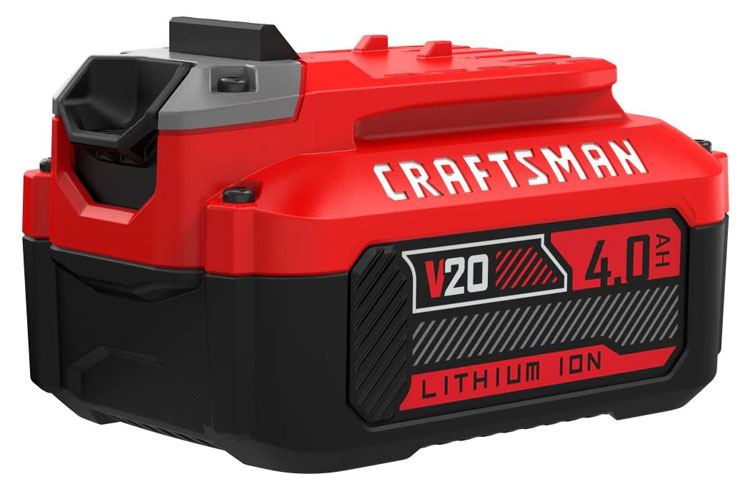
V20 Technology
Craftsman claims to have developed the ideal battery for their RP Brushless power tools. These 20-volt power packs are called V20 and are built with increased power and longevity in mind.
In fact, according on Craftsman, the V20 battery packs last 25% longer than any comparable battery pack on the market.
RP-Brushless Power
The newest Craftsman line of portable power tools now includes brushless 20V motors that are made to endure the toughest duties. The “RP” in Craftsman’s “RP” designation stands for “Runtime” and “Performance.”
According to Craftsman, each tool with this technology is able to outperform and outlast all other competitors.
Welded Metal Storage Suite
With their new Welded Metal Storage Suite, Craftsman truly earned a place of recognition. This collection comprises of five configurations that may be mixed and matched to meet individual demands and are proudly produced in the United States with worldwide parts. These containers also include internal locking systems that are keyed.
Warranty and Service
Warranty and customer service are both primary factors when one is looking to make a substantial investment in tools. In fact, a tool is of little value, if not covered by a solid warranty that works as hard as a tradesman himself.
The following is a synopsis of Porter-Cable and Craftsman’s current warranty policies.
Porter-Cable
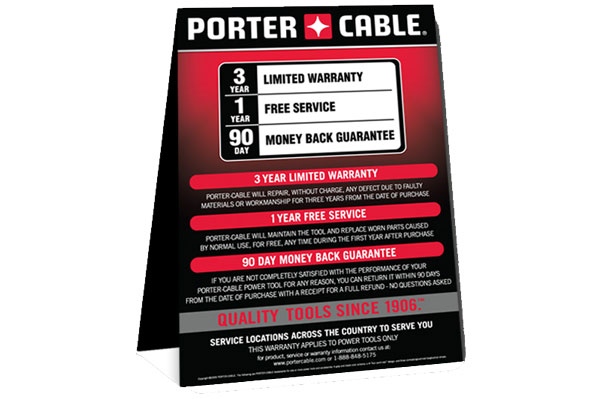
All Porter-Cable power tools are backed by a warranty policy of at least 1-year in duration, from the date of original purchase. However, many of the company’s tools are covered by a longer 3-year limited warranty.
In either case, these policies cover Porter-Cable power tools against problems that arise from material or workmanship-related defects.
Additionally, all Porter-Cable power tools also include a 1-year service plan, which covers labor and parts-related costs associated with a breakdown from normal wear/tear. This policy is provided to consumers free of charge.
Also of note, is the company’s issuance of a 90-day satisfaction guarantee. If for any reason, you are not satisfied with a Porter-Cable product within the first 90-days of purchase, simply return it for a full refund.
Craftsman

The customer care of Craftsman has long been recognized for excellence. This is a long-standing reputation that continues today, with many individuals still depending on Craftsman’s industry-leading warranty coverage.
Craftsman offers a three-year limited warranty on all power tools. This protection covers failure due to material or workmanship-related faults. If you have problems with your tool within the first three years, you may send it back to your local store for free repair or replacement. However, this warranty does not cover normal wear and tear on the instrument.
In addition, Craftsman hand tools are protected for life against any and all failures caused by regular usage. You don’t even need your original receipt to get coverage if warranty repair or replacement is required.
And The Winner Is…

Porter-Cable and Craftsman’s product catalogs are extremely similar, making a side-by-side comparison relatively difficult. This is especially true, considering each brand utilizes a similar 20V battery platform for its numerous power tools. However, we feel that Craftsman holds a slight advantage over Porter-Cable, in a couple of distinct areas.
Craftsman’s product portfolio is slightly larger than that of Porter-Cable, providing consumers with a higher level of versatility, especially in terms of battery usage. In certain cases, it might also be easier to locate retail outlets that carry and warranty Craftsman products, due to their prominent place within Lowe’s storefronts.
The bulk of Craftsman tools also carry a slightly better warranty than those marketed under the Porter-Cable brand name. This provides additional value to consumers and mitigates some of the risks associated with potential product failure. In our opinion, this alone is a worthy consideration.

